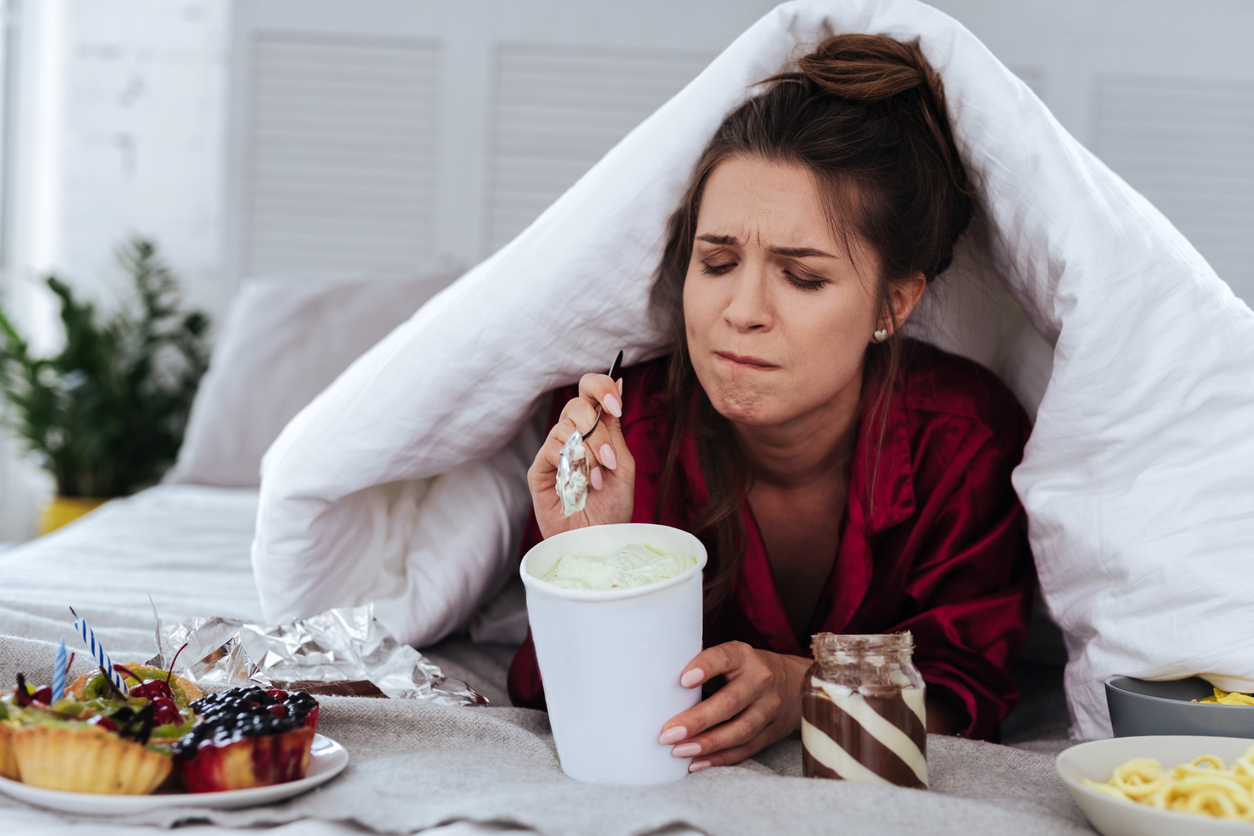Back in 2014, my husband’s military orders took us to Guam.
There was a lot of turmoil in the squadron and he was replacing an officer that had been fired for not so great reasons. On top of that, in the first month of his tenure on the job, the squadron lost a teammate due to a tragic diving accident.
It was a rough time.
One day I was making my grocery list and I noticed that every week we were running out of chocolate.
Fast.
So I counted it up. We were going through about 7-8 large dark chocolate bars plus a family sized bag of chocolate kisses per week.
Oops.
Why do we turn to food when we’re stressed?
It’s no surprise that stress does a number on our bodies.
- Stress triggers the release of cortisol (the fight or flight hormone).
- Chronic stress means cortisol is around all the time instead of only in heightened moments.
That fight or flight response is great if you’re running from a tiger. But if you’re feeling it all the time, that feels lousy.
It’s natural for the brain to want to soothe lousy feelings quickly.
What makes lousy feelings go away quickly (but temporarily)?
Foods with sugar, salt, & fat.
In addition, we’re constantly taught by the media and society to go on this external hunt to look for something outside ourselves to feel better.
- If that weren’t bad enough, increased cortisol is related to leptin resistance (the hormone that tells you you’re full.)
- Thus, when you’re stressed, you can end up eating more because you feel hungrier.
And the final kicker:
Stress uses up willpower.
- The brain shuttles blood flow away from the neocortex in order to give more reserves for essential functions.
- So you have less reserves available to make a positive choice.
Meaning you LITERALLY have less brain power available for making the decision to eat an apple instead of apple fritters.
Awesome.
So what do we do about it?
Given the way our lives are these days, it’s not likely that stress is going away.
So how can we manage the urge to eat from stress instead of finding ourselves looking at the bottom of a bag of chips after dinner?
Tip #1: Be a Scientist
A lot of times stress eating perpetuates itself because it comes with side helping of guilt and shame. We put so much meaning and blame on ourselves when we eat something we “shouldn’t” have.
But what if you could de-personalize things a little bit, let go of the shame and guilt, and look for patterns like a scientist?
Here’s what I mean:
When a scientist does an experiment, they are gathering data, looking for patterns, and forming conclusions based on that.
If they form a hypothesis that turns out to be wrong – that doesn’t mean they’re a bad scientist or a terrible person. They don’t go around beating themselves up.
They simply view their data as useful information that helps them tweak their experiment to get closer to a more accurate conclusion.
- What you eat is data.
- When you eat is data.
- What happened earlier in the day is data.
- How you were feeling that may have triggered stress eating is data.
How might you look at those events with curiosity and try to learn a little about yourself and your thoughts?
As you begin to look for patterns, you might notice that stress eating is worse on Tuesdays because that’s the day of the town hall meeting where you are required to present each week. Or you might notice that stress eating comes flying in hot very predictably at 4:37pm each day.
If you know what to expect, you can adjust and make a plan for it.
Bonus tip: Try keeping a note in your phone and jot down what thoughts or feelings you’re having when you notice the desire to eat when you’re not hungry. This can reveal some hidden patterns that you may not have been aware of.
Tip #2: Decide Less
Decisions require energy.
Stress drains energy.
When you’re low on energy, the brain will send signals to crave foods high in sugar, salt, and fat because that restores energy quickly.
When you’re stressed, your decisions are worse.
Make fewer decisions.
I like to think of willpower like a gas tank. In the morning, you start with a fresh, full tank of willpower. Over the course of the day, all kinds of things (like stress and making decisions) draw down your willpower tank. Sometimes you don’t even start the day on a full tank if you didn’t sleep well.
Do yourself and your willpower tank a favor by taking decisions out of your day whenever you can.
Plan ahead for what you’re going to eat.
- There are lots of different ways to meal plan, but many folks plan dinner meals for weeknights and leave themselves flexibility on weekends. Others start the day (before their willpower reserves are empty) and decide what they’ll eat for the rest of the day in the morning.
Plan for afternoon or late night snack time. When you feel tempted in the evening and you know that your willpower is already low, plan ahead for that time.
- Have a snack ready to go.
- Plan an activity to keep your mind busy.
- Do what you can to prepare.
When you know that it’s not your fault that your willpower is lower, you can prepare for it.
- Decide when you’re working out.
- Remove the “if” and replace it with “when”.
- Decide what kind of workout you want to do. Plan for these things when you have a fresh willpower tank.
- If you can, workout earlier in the day when your willpower tank is full so you’re more likely to be able to get over the natural friction to get going.
Do little things during the day to relieve stress.
- Go for a walk.
- Meditate for 1 min.
- Take 3 deep breaths.
- Pet a dog.
- Proactively feel grateful.
Handling stress eating is all about doing your future self a favor by setting your future self up for success.
#3: Train your brain like you’d train your puppy
“Training your brain is like training a puppy to sit or come or lie down. It’s all about meaning, simplicity, treats, and repetition.”
~Jen Sincero
Stress eating has a natural reward in the brain. Food relieves the tension of stress (temporarily) by triggering the release of positive neurotransmitters like dopamine and serotonin.
When you’re trying to avoid stress eating, you’re taking away your brain’s reward.
You can’t expect your brain to feel happy about not getting what it wants.
So if you want healthy habits to not be a chore, you need to give your brain a reward for doing it.
There are loads of ways you can give your brain what it’s looking for without food.
Here are a few ideas:
- Challenge yourself to text puppy pictures to 3 friends.
- Play 5 minutes of a game on your phone.
- Do a sudoku puzzle.
- Go sit outside for a few minutes and enjoy the sunshine, looking at a plant, or breathing non-recycled air.
- Read a fiction book for 10 minutes. (But avoid the news or social media. These things make your brain feel worse in the long run.)
- Talk with a spouse or someone you care about
- Play with a pet
How can you challenge yourself to find something quick and fun to do instead of grabbing food?
BONUS TIP: Take Your Brain To The Gym
It can be really easy to get down on yourself when you have a slip up or fall off the wagon. The way you talk to yourself in those moments makes all the difference.
Our brains evolved to keep us alive.
When Cavegal Sally could detect something amiss, she tended to survive longer than Cavegal Jill who was merrily strolling along appreciating the beauty of the savannah and didn’t notice the tiger lurking nearby.
Therefore, the default setting in your brain is to look for what’s wrong in the environment. Except these days, our brains look for what’s wrong with ourselves.
That means if you’re going to have a positive thought, you’ve got to PRACTICE it.
Just like you’re not gonna get stronger muscles by sitting on the couch, your thoughts aren’t gonna change if you don’t direct them on purpose.
Take your brain to the gym
Proactively carve out time to think about all the small steps and the little things you are doing for yourself to feel healthy. Look for evidence of what you want to find.
Attach your proactive thought time to something you already do regularly.
Ex: “When I brush my teeth, I’ll spend 1 minute proactively appreciating myself and looking for at least one thing I did to take care of myself today.”
Celebrating small victories is SO crucial!
That generates positive feelings of progress and those positive feelings are the fuel that runs the engine of motivation.
For example, if you’re trying to avoid bread, proactively take a moment when you choose a meal without bread to give yourself a mental high five. Like “Dang, I feel good! Whohoo! Go me!” (Yeah, it’s cheesy. Roll with it my friend. You gotta be your own biggest cheerleader.)
Stress may be a fact of life, but stress eating doesn’t have to be inevitable. You can observe your patterns, make a plan, and give your brain what it’s looking for without wrecking your diet.
And take time to have fun with the little rewards you give yourself. That has the added benefit of reducing stress too!
Lizzie Merritt is a professional weight loss coach helping women believe in themselves again. Lizzie works with clients to help them understand that they are not the problem when it comes to weight loss. Her approach is a heart- and mind-centered philosophy that helps rewire the brain for guiltless, shame-free weight loss. Lizzie is a Certified Martha Beck Wayfinder Life Coach and Noom diet coach. Learn more and connect with Lizzie at www.confidentbody.coach











Join the GloWell Community on Social!
Don't risk missing a single thing. Follow us on social and become part of the GloWell community.